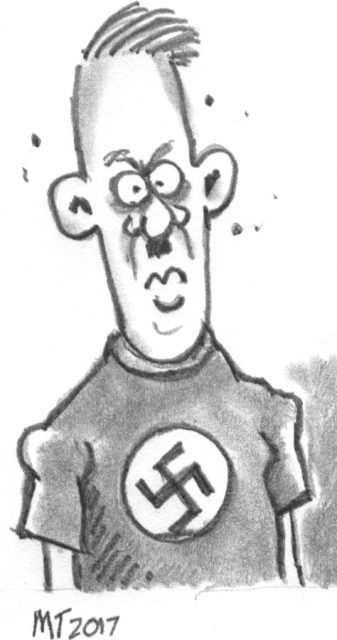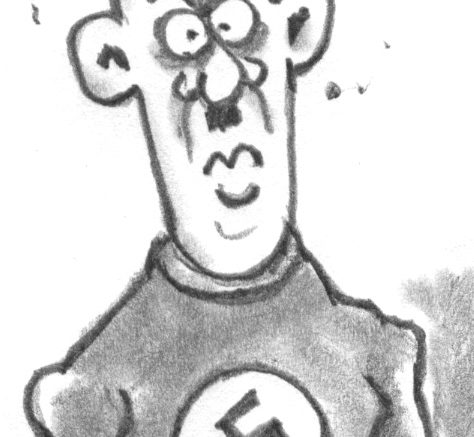
By John Feffer
Nation of Change (9/28/17)
Germany got its very own electoral shock this week when the far right won 13 percent of the vote in country’s parliamentary elections.
For the first time in more than half a century, the far right will be represented in the German parliament, with more than 90 seats. Although it’s now Germany’s third most popular party – behind the Christian Democrats (CDU) and the Social Democrats (SDP) – the Alternative for Germany (AfD) is still too toxic to become part of a ruling coalition.
But the AfD will have influence well beyond its numbers. “In a nutshell,” Deutsche Welle reports, “things are about to get a lot nastier.”
The AfD’s electoral victory has destroyed the taboo in Germany that has kept the far right on the fringes. It will inevitably pull the ruling Christian Democrats further to the right, particularly on social issues like immigration. It may even have an impact on the ongoing discussions about the fate of the European Union.
Beyond Germany, the AfD’s success will give a shot in the arm to other far-right formations, particularly after the National Front’s losses in the last French elections. Looking a little further down the road, if it manages to return to parliament in the next election, the AfD will qualify for government money to create its own party foundation, which will enable Germany’s far right to spread its message all over the world.
Europe’s rebellion against liberalism – in both its economic and social versions – is continuing to shake up politics as usual. An equally unsettling question, though, is how much it will shake up geopolitics as usual.
What the AfD wants
The far right in Germany has followed much the same script as the Tea Party and the Trump movement in the United States.
It began in 2013 with several academics angry about the Eurozone (and, by extension, the European Union). But just like economist Dave Brat was an obscure political hopeful until he started talking about the so-called “threat” of immigrants in Virginia – and ended up taking House Majority Leader Eric Cantor’s seat in 2014 – the AfD only became truly popular by stoking anti-immigrant sentiment.
As Chancellor Angela Merkel of the Christian Democrats welcomed refugees into Germany in 2015 – an influx, to date, of around 1.3 million people – the AfD began to peel away support from the center-right CDU. Even the purportedly moderate faces of the AfD, like Jorg Muethen, have made statements like, “in some German cities, I struggle to find Germans on the streets,” thus equating German citizenship with skin color or other external markers.
The party has advocated border controls – effectively abrogating the Schengen system of free movement within many EU member states – as well as new border patrols. Frauke Petry, a party leader who is also considered a moderate, has said that these new border police units should shoot at migrants if necessary as they try to make it into the country.
One party leader, Bjorn Hocke, has called for a “180-degree turnaround” in German attitudes about the Nazi era. Since current German policy is firmly in the camp of condemnation of Nazis, it’s quite sobering to imagine the kind of policy that Hocke prefers.
Central to the anti-immigrant message has been Islamophobia. The party plastered the streets of Germany with posters like one that showed two young, bikini-clad women from behind that read, “Burkas? We like bikinis.” On Facebook, it distributed an ad showing bloody tire tracks with the caption, “The tracks left by the world chancellor in Europe,” linking Merkel’s refugee policy to terrorist attacks around the continent.
The party has other deeply disturbing positions, like its denial of climate change. But what has caused some division within the party is its attitude toward German history. One party leader, Bjorn Hocke, has called for a “180-degree turnaround” in German attitudes about the Nazi era. Since current German policy is firmly in the camp of condemnation of Nazis, it’s quite sobering to imagine the kind of policy that Hocke prefers.
This German corollary to Trump’s appeal to white supremacists and neo-Nazis has divided the party. Frauke Petry abruptly walked out of an AfD press conference this week after announcing that she wouldn’t sit in parliament with the party faction. Reportedly, Petry has wanted to purge the party of its extremist elements – at least those who take an extremist position on the history question – just as Marine Le Pen attempted to clean up the National Front by kicking her anti-Semitic father out of the French far-right party.
According to Spiegel’s analysis of AfD’s likely MPs, 35 of 94 are “right wing extremists.” So, it’s not just about a purge of one or two bad apples. Expect the AfD to split along the same realoand fundi – realist vs. fundamentalist – fault line of the Greens.
A key connection between AfD and Trump, the U.K. Independence Party, and right-wing Israeli Prime Minister Benjamin Netanyahu is their ad man, Vincent Harris. He’s responsible for the bikini and tire tracks ad campaigns. He’s adept at fusing anti-immigrant, Islamophobic, and race-baiting messages. But with one of his suggestions for the AfD, Harris went too far. The party rejected his suggestion of “Germany for Germans” as a campaign slogan. Perhaps it will resurface in the next election, if the so-called moderates abandon the party.
Finally, what would a modern election be without Russian interference?
In the lead-up to the election, several major newspapers noted that Russian involvement in the German vote was scant. Perhaps they spoke too soon. First to consider are the Russian speakers, those with German heritage who’ve relocated to Germany since the 1980s – the right kind of immigrants from AfD’s point of view. The AfD estimates that fully one-third of its support comes from this constituency, and it has helped the party become the second most popular one in former East Germany.
Then there was the obligatory visit to Moscow, as Petry made her pilgrimage last February and met with, among others, the truly beyond-the-pale politician Vladimir Zhirinovsky. As the election entered its last phase, the usual trolls and Twitter bots came out to play, at least some of them Russians supporting AfD.
Again, as with Trump, the Kremlin isn’t interested in promoting a particular party in the hopes that it will win or reorient the country’s foreign policy. It simply wants to shake up a status quo that it perceives as tilted against Russia.
Has the right already won?
Even though the radical right has lost some recent elections – notably in France and in the Netherlands – it has nevertheless transformed the debate in Europe.
Consider the immigration situation. This month, the two-year program to relocate 160,000 migrants from Greece and Italy to other EU member states came to an end. It managed to relocate only 28,000 people, and only with great effort. Some countries – notably Poland and Hungary – refused to locate a single migrant. More than 20 member states failed to meet their obligatory target by 50 percent.
Far right populists poisoned the discourse on immigration, denouncing millions of people as well as linking this “scourge” to the EU, multiculturalism, and liberal politics more generally. Throughout the continent, EU member states are tightening their immigration laws, increasing the number of deportations, and sweeping away informal settlements like the “Jungle” in the northern French town of Calais.
“The right-wing populists have already won the upcoming elections in Europe, no matter what the outcome is,” writes Krsto Lazarevic in Deutsche Welle. “The EU has done away with human rights and Western standards of civilization by cooperating with the Libyan coastguard, African dictators, and deporting people back to war zones.”
Then there’s the issue of helping countries like Greece exit their perpetual financial crisis. …
(Commoner Call cartoon by Mark L. Taylor, 2017. Open source and free to use with link to www.thwcommonercall.org )
*****
Neo-Nazis & Anti-Fascists Clash In Sweden On Jewish Holy Day Of Yom Kippur
DW News (9/30/17)
Swedish police arrested more than 20 people Saturday as they tried to keep neo-Nazis and anti-fascists from clashing in Sweden’s second largest city.
The Nordic Resistance Movement (NMR), a right-wing extremist group that is openly anti-Semitic, received permission from police to hold their rally on Yom Kippur, the holiest day of the Jewish calendar.
The NMR originally sought to march past a Jewish synagogue but a court rejected their proposed route, and shortened it to little more than half a mile (1 kilometer).
About 600 people wore all-black outfits as they marched in formation. Some waved the movement’s green and white flag, and some wore helmets and carried shields, as they went through Goteborg about 250 miles southwest of the capital Stockholm.
Authorities posted fliers ahead of the rally warning demonstrators against behaving like German Nazi’s “National Socialist demonstrations in the 1930s and 1940s.”
The end time for the march was also scaled back by one hour to prevent potential clashes with attendees of a nearby football game.
Neo-Nazis and anti-fascists
Anti-fascists, the counter-demonstrators, tossed fireworks and made several attempts to break through police lines in an apparent effort to confront NMR members who also tried to get past riot police. Some were arrested and charged with rioting, according to police.
Among those arrested was one person accused of kicking a policeman in the face and two others who were detained for carrying knives.
“Stones, bottles and sticks were also thrown at us,” police spokesman Hans Lippens said. …
Read the Rest and 4-Minute Video
- The Nordic Resistance Movement Try To Force Through Swedish Police Barricade: 5-Minute Video

